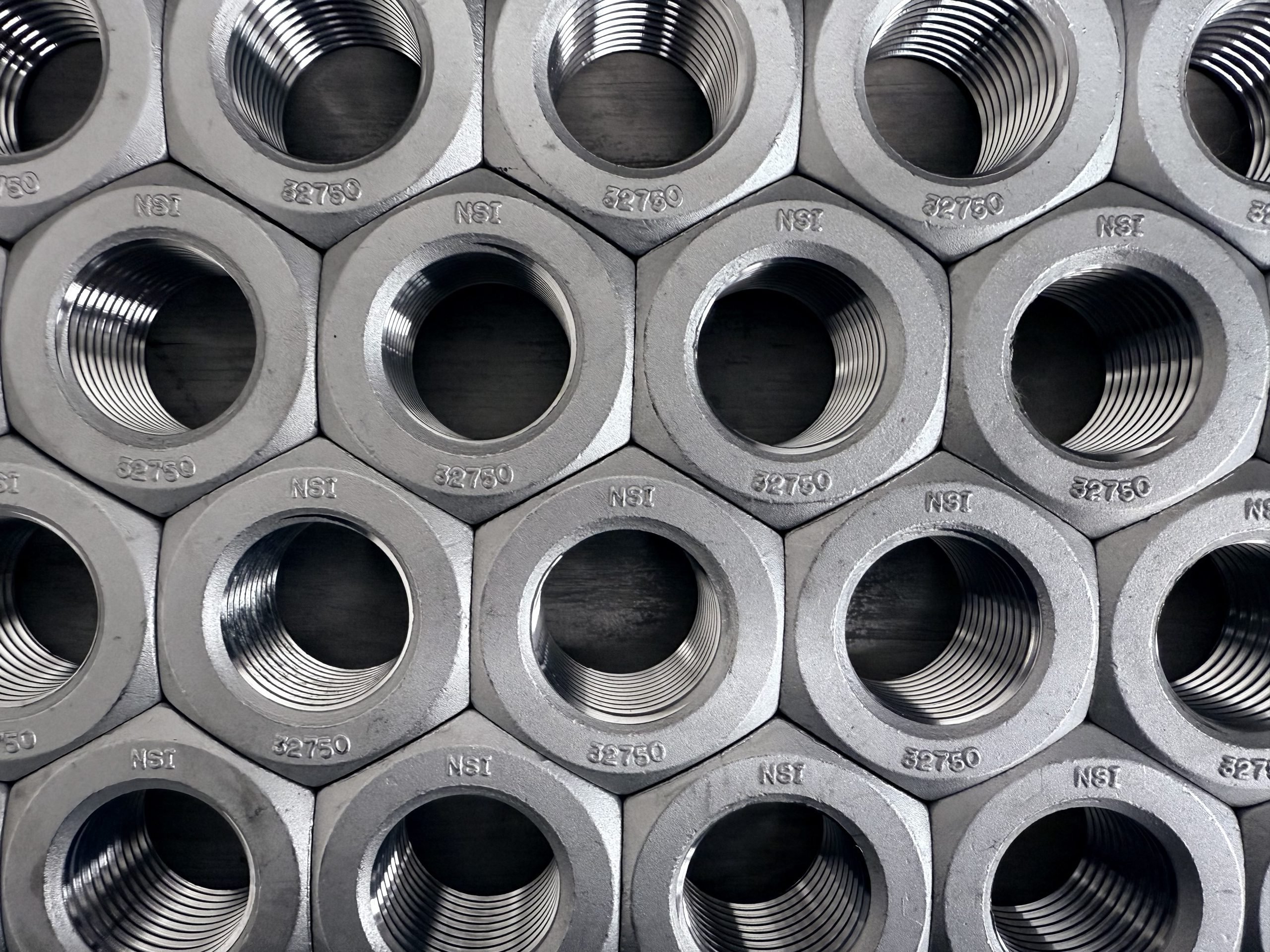Specifications
- 316 Bolts: ASTM A193 B8M Class 2
- 316 Nuts: ASTM A194 Grade 8M Class 2

316 Stainless Steel is an austenitic alloy highly valued for its improved resistance to corrosion compared to similar stainless steel grades such as 304. It also provides superior mechanical strength and durability. Nickel Systems provides premium-quality 316 Stainless Steel fasteners to meet the demands of numerous industries facing chemically challenging operating conditions.
The following tables detail the key physical and mechanical properties of 316 Stainless Steel. If your question is not covered below, please download the complete technical data sheet.
Density: 0.285 lb/in3 Poisson’s Ratio: 0.3 Electrical Resistivity: 445 Ohm-circ mil/ft
| Temperature, °F | 70 | 212 | 932 | 1832 |
| Coefficient* of Thermal Expansion, in/in°F x 10-6 | – | 9.2 | 10.1 | 10.8 |
| Thermal Conductivity, Btu • ft/ft2 • hr • °F | 7.8 | – | – | – |
| Modulus of Elasticity Dynamic, psi x 106 | 29 | – | – | – |
* 70°F to indicated temperature.
| Temperature, °F | 70 | 200 | 400 | 600 | 800 | 1000 | 1200 | 1400 |
| Ultimate Tensile Strength, ksi | 82.4 | 75.6 | 71.1 | 71.1 | 71.1 | 68.4 | 50.7 | 30.7 |
| 0.2% Yield Strength, ksi | 42.2 | – | – | – | 26.5 | 23.4 | 22.6 | – |
| Charpy Impact V-notch, ft-lbs | 65-100 | – | – | – | – | – | – | – |
316 Stainless Steel is often referred to as “marine-grade” steel due to its excellent resistance to saltwater corrosion.
UNS S31600 is a stainless steel alloy composed primarily of iron, chromium, nickel and molybdenum. The inclusion of 2-3% molybdenum significantly improves resistance to pitting and crevice corrosion, particularly in chloride-rich environments like marine and chemical processing applications. It also contains approximately 16-18% chromium and 10-14% nickel, which contribute to excellent toughness, formability and weldability.
Common variants include 316L (low-carbon), ideal for welded structures to prevent sensitization, and 316H (higher carbon), designed to withstand elevated temperatures through improved creep resistance.
316 Stainless Steel comprises:
Please note that the above composition follows ASTM material specifications for Alloy UNS S31600. Some trademarked alloys may exhibit slight variations within the UNS number range. Specify any nonstandard composition, fastener specification or trademarked alloy before submitting your quote.
This alloy is also known as:
316 and 304 Stainless Steels belong to the austenitic family. The key difference between these grades is in their composition and resistance to corrosion. 316 Stainless Steel contains 2% to 3% molybdenum, improving resistance to chloride-induced stress corrosion cracking, crevice corrosion and pitting. In contrast, 304 lacks molybdenum and is more vulnerable to these types of corrosion.
Some of the primary applications for UNS S31600 include:
Fasteners made from marine-grade stainless steel are essential for industries where strength and corrosion resistance are critical. Nickel Systems offers a broad selection of AISI 316 fasteners, including:
At Nickel Systems, we have built a reputation for delivering top-tier 316 Stainless Steel fasteners quickly. Our large inventory makes it easy to find any type of fastener you are looking for, and we have the capabilities to engineer custom solutions to suit special projects. Our experts are happy to help you to find the products and materials that best suit your application. Contact us today for a quote.
